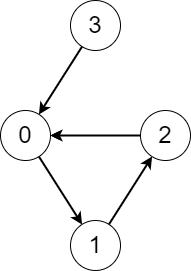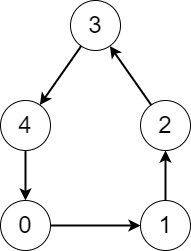There is a directed graph consisting of n nodes numbered from 0 to n - 1 and n directed edges.
You are given a 0-indexed array edges where edges[i] indicates that there is an edge from node i to node edges[i].
Consider the following process on the graph:
- You start from a node
xand keep visiting other nodes through edges until you reach a node that you have already visited before on this same process.
Return an array answer where answer[i] is the number of different nodes that you will visit if you perform the process starting from node i.
Example 1:
Input: edges = [1,2,0,0] Output: [3,3,3,4] Explanation: We perform the process starting from each node in the following way: - Starting from node 0, we visit the nodes 0 -> 1 -> 2 -> 0. The number of different nodes we visit is 3. - Starting from node 1, we visit the nodes 1 -> 2 -> 0 -> 1. The number of different nodes we visit is 3. - Starting from node 2, we visit the nodes 2 -> 0 -> 1 -> 2. The number of different nodes we visit is 3. - Starting from node 3, we visit the nodes 3 -> 0 -> 1 -> 2 -> 0. The number of different nodes we visit is 4.
Example 2:
Input: edges = [1,2,3,4,0] Output: [5,5,5,5,5] Explanation: Starting from any node we can visit every node in the graph in the process.
Constraints:
n == edges.length2 <= n <= 1050 <= edges[i] <= n - 1edges[i] != i
Solution 1: Basic Tree + Traversal
We can use an array
For each node
- If we encounter a node that has been visited before during the traversal, then we must have first entered the cycle and then walked around the cycle. For nodes outside the cycle, their answer is the length of the cycle plus the distance from the node to the cycle; for nodes inside the cycle, their answer is the length of the cycle.
- If we encounter a node that has been visited before during the traversal, then for each visited node, its answer is the distance from the current node to this node plus the answer of this node.
The time complexity is
class Solution:
def countVisitedNodes(self, edges: List[int]) -> List[int]:
n = len(edges)
ans = [0] * n
vis = [0] * n
for i in range(n):
if not ans[i]:
cnt, j = 0, i
while not vis[j]:
cnt += 1
vis[j] = cnt
j = edges[j]
cycle, total = 0, cnt + ans[j]
if not ans[j]:
cycle = cnt - vis[j] + 1
total = cnt
j = i
while not ans[j]:
ans[j] = max(total, cycle)
total -= 1
j = edges[j]
return ansclass Solution {
public int[] countVisitedNodes(List<Integer> edges) {
int n = edges.size();
int[] ans = new int[n];
int[] vis = new int[n];
for (int i = 0; i < n; ++i) {
if (ans[i] == 0) {
int cnt = 0, j = i;
while (vis[j] == 0) {
vis[j] = ++cnt;
j = edges.get(j);
}
int cycle = 0, total = cnt + ans[j];
if (ans[j] == 0) {
cycle = cnt - vis[j] + 1;
}
j = i;
while (ans[j] == 0) {
ans[j] = Math.max(total--, cycle);
j = edges.get(j);
}
}
}
return ans;
}
}class Solution {
void dfs(int curr, List<Integer> edges, int[] ans) {
List<Integer> path = new ArrayList<>();
int prev = -1;
while (ans[curr] == 0) {
path.add(curr);
ans[curr] = prev == -1 ? -1 : ans[prev] - 1;
prev = curr;
curr = edges.get(curr);
}
int idx = path.size() - 1;
if (ans[curr] < 0) {
int cycle = ans[curr] - ans[path.get(idx)] + 1;
int start = ans[curr];
for (; idx >= 0 && ans[path.get(idx)] <= start; idx--) {
ans[path.get(idx)] = cycle;
}
}
for (; idx >= 0; idx--) {
ans[path.get(idx)] = ans[edges.get(path.get(idx))] + 1;
}
}
public int[] countVisitedNodes(List<Integer> edges) {
int n = edges.size();
int[] ans = new int[n];
for (int i = 0; i < n; i++) {
if (ans[i] > 0) {
continue;
}
dfs(i, edges, ans);
}
return ans;
}
}class Solution {
public:
vector<int> countVisitedNodes(vector<int>& edges) {
int n = edges.size();
vector<int> ans(n), vis(n);
for (int i = 0; i < n; ++i) {
if (!ans[i]) {
int cnt = 0, j = i;
while (vis[j] == 0) {
vis[j] = ++cnt;
j = edges[j];
}
int cycle = 0, total = cnt + ans[j];
if (ans[j] == 0) {
cycle = cnt - vis[j] + 1;
}
j = i;
while (ans[j] == 0) {
ans[j] = max(total--, cycle);
j = edges[j];
}
}
}
return ans;
}
};func countVisitedNodes(edges []int) []int {
n := len(edges)
ans := make([]int, n)
vis := make([]int, n)
for i := range ans {
if ans[i] == 0 {
cnt, j := 0, i
for vis[j] == 0 {
cnt++
vis[j] = cnt
j = edges[j]
}
cycle, total := 0, cnt+ans[j]
if ans[j] == 0 {
cycle = cnt - vis[j] + 1
}
j = i
for ans[j] == 0 {
ans[j] = max(total, cycle)
total--
j = edges[j]
}
}
}
return ans
}
func max(a, b int) int {
if a > b {
return a
}
return b
}function countVisitedNodes(edges: number[]): number[] {
const n = edges.length;
const ans: number[] = Array(n).fill(0);
const vis: number[] = Array(n).fill(0);
for (let i = 0; i < n; ++i) {
if (ans[i] === 0) {
let [cnt, j] = [0, i];
while (vis[j] === 0) {
vis[j] = ++cnt;
j = edges[j];
}
let [cycle, total] = [0, cnt + ans[j]];
if (ans[j] === 0) {
cycle = cnt - vis[j] + 1;
}
j = i;
while (ans[j] === 0) {
ans[j] = Math.max(total--, cycle);
j = edges[j];
}
}
}
return ans;
}

